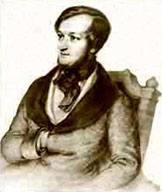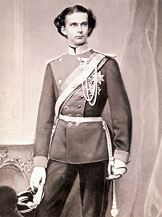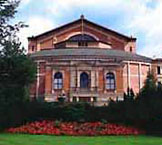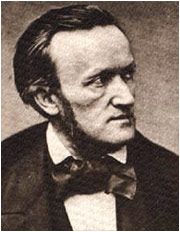|
The Perfect Wagnerite:
A Commentary on the Niblung's Ring
by Bernard Shaw
THE MUSIC OF THE FUTURE
The success of Wagner has been so prodigious that to his dazzled
disciples it seems that the age of what he called "absolute music
must be at an end, and the musical future destined to be an
exclusively Wagnerian one inaugurated at Bayreuth. All great
geniuses produce this illusion. Wagner did not begin a movement:
he consummated it. He was the summit of the nineteenth century
school of dramatic music in the same sense as Mozart was the
summit (the word is Gounod's) of the eighteenth century school.
And those who attempt to carry on his Bayreuth tradition will
assuredly share the fate of the forgotten purveyors of
second-hand Mozart a hundred years ago. As to the expected
supersession of absolute music, it is sufficient to point to the
fact that Germany produced two absolute musicians of the first
class during Wagner's lifetime: one, the greatly gifted Goetz,
who died young; the other, Brahms, whose absolute musical
endowment was as extraordinary as his thought was commonplace.
Wagner had for him the contempt of the original thinker for the
man of second-hand ideas, and of the strenuously dramatic
musician for mere brute musical faculty; but though his contempt
was perhaps deserved by the Triumphlieds, and Schicksalslieds,
and Elegies and Requiems in which Brahms took his brains so
seriously, nobody can listen to Brahms' natural utterance of the
richest absolute music, especially in his chamber compositions,
without rejoicing in his amazing gift. A reaction to absolute
music, starting partly from Brahms, and partly from such revivals
of medieval music as those of De Lange in Holland and Mr. Arnold
Dolmetsch in England, is both likely and promising; whereas there
is no more hope in attempts to out-Wagner Wagner in music drama
than there was in the old attempts--or for the matter of that,
the new ones--to make Handel the starting point of a great school
of oratorio.
BAYREUTH
When the Bayreuth Festival Playhouse was at last completed, and
opened in 1876 with the first performance of The Ring, European
society was compelled to admit that Wagner was "a success."
Royal personages, detesting his music, sat out the performances
in the row of boxes set apart for princes. They all complimented
him on the astonishing "push" with which, in the teeth of all
obstacles, he had turned a fabulous and visionary project into a
concrete commercial reality, patronized by the public at a pound
a head. It is as well to know that these congratulations had no
other effect upon Wagner than to open his eyes to the fact that
the Bayreuth experiment, as an attempt to evade the ordinary
social and commercial conditions of theatrical enterprise, was a
failure. His own account of it contrasts the reality with his
intentions in a vein which would be bitter if it were not so
humorous. The precautions taken to keep the seats out of the
hands of the frivolous public and in the hands of earnest
disciples, banded together in little Wagner Societies throughout
Europe, had ended in their forestalling by ticket speculators and
their sale to just the sort of idle globe-trotting tourists
against whom the temple was to have been strictly closed. The
money, supposed to be contributed by the faithful, was begged by
energetic subscription-hunting ladies from people who must have
had the most grotesque misconceptions of the composer's aims--
among others, the Khedive of Egypt and the Sultan of Turkey!
The only change that has occurred since then is that
subscriptions are no longer needed; for the Festival Playhouse
apparently pays its own way now, and is commercially on the same
footing as any other theatre. The only qualification required
from the visitor is money. A Londoner spends twenty pounds on a
visit: a native Bayreuther spends one pound. In either case "the
Folk," on whose behalf Wagner turned out in 1849, are effectually
excluded; and the Festival Playhouse must therefore be classed as
infinitely less Wagnerian in its character than Hampton Court
Palace. Nobody knew this better than Wagner; and nothing can be
further off the mark than to chatter about Bayreuth as if it had
succeeded in escaping from the conditions of our modern
civilization any more than the Grand Opera in Paris or London.
Within these conditions, however, it effected a new departure in
that excellent German institution, the summer theatre. Unlike our
opera houses, which are constructed so that the audience may
present a splendid pageant to the delighted manager, it is
designed to secure an uninterrupted view of the stage, and an
undisturbed hearing of the music, to the audience. The dramatic
purpose of the performances is taken with entire and elaborate
seriousness as the sole purpose of them; and the management is
jealous for the reputation of Wagner. The commercial success
which has followed this policy shows that the public wants summer
theatresof the highest class. There is no reason why the
experiment should not be tried in England. If our enthusiasm for
Handel can support Handel Festivals, laughably dull, stupid and
anti-Handelian as these choral monstrosities are, as well as
annual provincial festivals on the same model, there is no
likelihood of a Wagner Festival failing. Suppose, for instance, a
Wagner theatre were built at Hampton Court or on Richmond Hill,
not to say Margate pier, so that we could have a delightful
summer evening holiday, Bayreuth fashion, passing the hours
between the acts in the park or ontheriver before sunset, is it
seriously contended that there would be any lack of visitors? If
a little of the money that is wasted on grand stands, Eiffel
towers, and dismal Halls by the Sea, all as much tied to brief
annual seasons as Bayreuth, were applied in this way, the profit
would be far more certain and the social utility prodigiously
greater. Any English enthusiasm for Bayreuth that does not take
the form of clamor for a Festival Playhouse in England may be set
aside as mere pilgrimage mania.
Those who go to Bayreuth never repent it, although the
performances there are often far from delectable. The singing is
sometimes tolerable, and some times abominable. Some of the
singers are mere animated beer casks, too lazy and conceited to
practise the self-control and physical training that is expected
as a matter of course from an acrobat, a jockey or a pugilist.
The women's dresses are prudish and absurd. It is true that
Kundry no longer wears an early Victorian ball dress with
"ruchings," and that Fresh has been provided with a quaintly
modish copy of the flowered gown of Spring in Botticelli's famous
picture; but the mailclad Brynhild still climbs the mountains
with her legs carefully hidden in a long white skirt, and looks
so exactly like Mrs. Leo Hunter as Minerva that it is quite
impossible to feel a ray of illusion whilst looking at her. The
ideal of womanly beauty aimed at reminds Englishmen of the
barmaids of the seventies, when the craze for golden hair was at
its worst. Further, whilst Wagner's stage directions are
sometimes disregarded as unintelligently as at Covent Garden, an
intolerably old-fashioned tradition of half rhetorical, half
historical-pictorial attitude and gesture prevails. The most
striking moments of the drama are conceived as tableaux vivants
with posed models, instead of as passages of action, motion and
life.
I need hardly add that the supernatural powers of control
attributed by credulous pilgrims to Madame Wagner do not exist.
Prima donnas and tenors are as unmanageable at Bayreuth as
anywhere else. Casts are capriciously changed; stage business is
insufficiently rehearsed; the public are compelled to listen to a
Brynhild or Siegfried of fifty when they have carefully arranged
to see one of twenty-five, much as in any ordinary opera house.
Even the conductors upset the arrangements occasionally. On the
other hand, if we leave the vagaries of the stars out of account,
we may safely expect always that in thoroughness of preparation
of the chief work of the season, in strenuous artistic
pretentiousness, in pious conviction that the work is of such
enormous importance as to be worth doing well at all costs, the
Bayreuth performances will deserve their reputation. The band is
placed out of sight of the audience, with the more formidable
instruments beneath the stage, so that the singers have not to
sing THROUGH the brass. The effect is quite perfect.
The
greatest composer of German opera, Richard Wagner, b. Leipzig,
May 22, 1813, was the youngest of nine children of Friedrich
and Johanna Wagner. His father, a police registrar, died 6
months after Wagner was born, and his mother was remarried
the following year to Ludwig Geyer, an actor and portrait
painter, who moved the family to Dresden.
Geyer
died in 1821, and in 1827 the family returned to Leipzig.
Wagner was attracted to the theatre at an early age.
 His
formal music training was brief - about 6 months in 1831-32 with
the Leipzig cantor C.T. Weinlig. During the 1830s, Wagner held
a series of conducting posts with small theatrical companies, and
he wrote two operas, Die Feen (The Fairies, 1834) and Das
Liebesverbot (Forbidden Love; after Shakespeare's Measure for
Measure); His third opera, Rienzi, was conceived on a larger
scale, and Wagner travelled to Paris in 1839 with the futile hope
of having it performed there. Rienzi was finally accepted for performance
in Dresden in 1842. Its success, coupled with that of Der fliegende
Holländer (The Flying Dutchman) the following year, led
to Wagner's appointment to an official conducting post in Dresden.
His
formal music training was brief - about 6 months in 1831-32 with
the Leipzig cantor C.T. Weinlig. During the 1830s, Wagner held
a series of conducting posts with small theatrical companies, and
he wrote two operas, Die Feen (The Fairies, 1834) and Das
Liebesverbot (Forbidden Love; after Shakespeare's Measure for
Measure); His third opera, Rienzi, was conceived on a larger
scale, and Wagner travelled to Paris in 1839 with the futile hope
of having it performed there. Rienzi was finally accepted for performance
in Dresden in 1842. Its success, coupled with that of Der fliegende
Holländer (The Flying Dutchman) the following year, led
to Wagner's appointment to an official conducting post in Dresden.
There
he completed Tannhäuser (1845) and Lohengrin
(1848). This period of success ended in 1849, however, when his
participation in revolutionary political activities forced him to
flee to Switzerland. Wagner's exile from Germany, which lasted until
1860, marks the start of a new period in his career.
 Wagner
began composing the non-conventional opera-cycle Der Ring des
Nibelungen (THE RING OF THE NIBELUNG) in 1848 and did not finish
until 1874.
Wagner
began composing the non-conventional opera-cycle Der Ring des
Nibelungen (THE RING OF THE NIBELUNG) in 1848 and did not finish
until 1874.
The
last great turning point in Wagner's fortunes occurred in
1864 when he was called to Munich by the eccentric young king
of Bavaria, Ludwig II, an ardent admirer of his works and
theories. Ludwig's patronage continued for the last 20 years
of Wagner's life, making possible the performance of all his
mature works and eventually the construction in Bayreuth of
a theatre of Wagner's own design. It was opened in 1876 with
the first complete production of the Ring. Bayreuth soon became
the centre for the promotion of Wagner's works and ideology.
His last opera, Parsifal, was performed in 1882, with
the ceremony normally accorded only to a religious event.
Following
Wagner's death on Feb. 13, 1883, control of the Bayreuth festival
passed to his second wife, Cosima (a daughter of Franz Liszt), and
later to their children and grandchildren, a succession that has
continued to the present.
The
use of legendary sources and the gradual reduction in contrast between
aria and recitative in these operas anticipate the new music drama
that Wagner was to propose in the treatises written about 1850.
The guiding principles of his theory were naturalism and dramatic
truth, which he felt had been compromised by the musical conventions
of contemporary opera.
 He advocated a new synthesis of music, verse, and staging
- what he called a Gesamtkunstwerk. The verse, which
Wagner always wrote himself, was to be compressed, metrically
free, and alliterative, dispensing with the end-rhyme that
led to closed musical structures. The open-ended melody of
the vocal line was to be supported by a symphonic accompaniment,
continuously fluctuating with the sense of the text and unified
by a web of motifs associated more or less directly with characters,
things, ideas, or events.
He advocated a new synthesis of music, verse, and staging
- what he called a Gesamtkunstwerk. The verse, which
Wagner always wrote himself, was to be compressed, metrically
free, and alliterative, dispensing with the end-rhyme that
led to closed musical structures. The open-ended melody of
the vocal line was to be supported by a symphonic accompaniment,
continuously fluctuating with the sense of the text and unified
by a web of motifs associated more or less directly with characters,
things, ideas, or events.
Wagner
called these motifs Grundthemen, but they have become better
known as leitmotifs ("leading motifs").
This
theoretical music drama was exemplified in its purest form in "Der
Ring des Nibelungen".
|








 Download full version of Ring movie
Download full version of Ring movie


